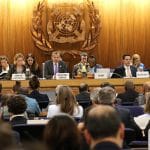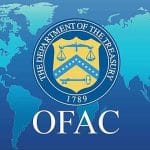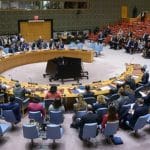The ozone layer, which protects against harmful ultraviolet rays from the sun, is on track to recover within four decades, a UN-backed panel of experts said on January 9.
Presenting at the American Meteorological Society’s 103rd annual meeting, the UN-backed Scientific Assessment Panel to the Montreal Protocol on Ozone Depleting Substances confirmed that the phase-out of nearly 99% of banned ozone-depleting substances has reversed a process that created a massive hole in the ozone layer more than forty years ago.
The Montreal Protocol has succeeded in safeguarding the ozone layer, leading to a notable recovery of the ozone layer in the upper stratosphere and decreased human exposure to harmful ultraviolet rays from the sun, the UN’s Environment Program said in a press release.
The Montreal Protocol is a global agreement to protect the Earth’s ozone layer by phasing out the chemicals that deplete it.
“The fact that the international agreement with the Montreal Protocol in the late 1980s, and the later Kigali Amendment in 2016, have been instrumental in the slow recovery of the ozone layer is a very welcoming update, also because of the important consequences in terms of global warming – a ‘healed’ ozone layer will avoid a few tens of degrees of warming by the end of the century,” explained Alberto Troccoli, the managing director of World Energy & Meteorology Council at the School of Environmental Studies at the University of East Anglia in Norwich, who spoke with NE Global on January 11.
“While this is an important lesson in international diplomacy and a possible useful reference for the broader climate change issues, it is extremely challenging to upscale this approach to agreements such as the Kyoto Protocol of 1997, or the Paris Accord of 2015, in the way these have been framed thus far as they deal with multi-faceted multi-sectoral complex problems,” Troccoli said. “Perhaps the key learning from the ozone layer recovery is that climate change agreements need to be broken down into well-defined, more tangible and, in principle, more manageable, issues than a broad carbon emission reduction, such as a dramatic reduction in air pollution.”
If the current policies remain in place, the ozone layer is expected to recover to 1980 values (before the appearance of the ozone hole) by around 2066 over the Antarctic, by 2045 over the Arctic and by 2040 for the rest of the world.
Variations in the size of the Antarctic ozone hole, particularly between 2019 and 2021, were driven largely by meteorological conditions. Nevertheless, the Antarctic ozone hole has been slowly improving in area and depth since the year 2000.
“That ozone recovery is on track according to the latest quadrennial report is fantastic news. The impact the Montreal Protocol has had on climate change mitigation cannot be overstressed. Over the last 35 years, the Protocol has become a true champion for the environment,” Meg Seki, Executive Secretary of the United Nations Environment Program’s Ozone Secretariat, said. “The assessments and reviews undertaken by the Scientific Assessment Panel remain a vital component of the work of the Protocol that helps inform policy and decision-makers.”
The 10th edition of the Scientific Assessment Panel reaffirmed the positive impact the treaty has already had on the climate. An additional 2016 agreement, known as the Kigali Amendment to the Montreal Protocol, requires a phase-down of the production and consumption of many hydrofluorocarbons (HFCs).
HFCs do not directly deplete ozone but are powerful climate change gases. The Scientific Assessment Panel said this amendment is estimated to avoid 0.3–0.5°C of warming by 2100, but this does not include contributions from HFC-23 emissions, the UN Environment Program said
“Ozone action sets a precedent for climate action. Our success in the phasing-out ozone-eating chemicals shows us what can and must be done – as a matter of urgency – to transition away from fossil fuels, reduce greenhouse gases and so limit temperature increases,” said WMO Secretary-General Petteri Taalas.
The latest assessment was made based on extensive studies, as well as from research and data compiled by a large international group of experts, including many from the World Meteorological Organization, United Nations Environment Program, the US National Oceanic and Atmospheric Administration, NASA and the European Union.
For the first time, the Scientific Assessment Panel examined the potential effects on ozone of the intentional addition of aerosols into the stratosphere, known as a stratospheric aerosol injection, which has been proposed as a potential method to reduce climate warming by increasing sunlight reflection.
The panel has, however, cautioned that the unintended consequences of stratospheric aerosol injections “could also affect stratospheric temperatures, circulation and ozone production and destruction rates and transport.”








